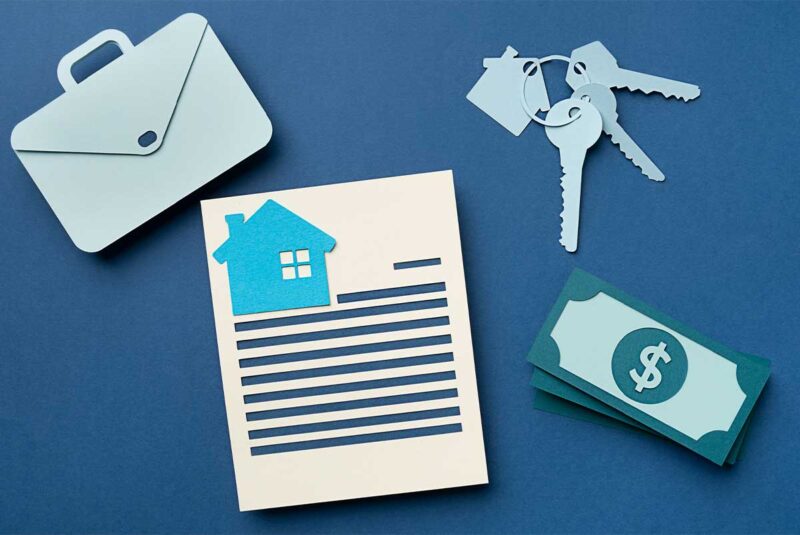Ready To Buy a Home?
Get Approved to Buy a Home
Rocket Mortgage® lets you get to house hunting sooner.
Are you in the market for a mortgage to purchase a new home? If so, you may have heard the terms prequalification and preapproval. But what exactly are they, and are they the same thing?
While both terms sound similar, there’s a big difference between the two – and understanding that distinction can give you a leg up in the home buying process and help determine how much house you can afford.
Let’s discuss prequalification versus preapproval and which one you should get first.
Prequalified vs. Preapproved: An Overview
Prequalification and preapproval are two different steps in the mortgage process. Here’s a closer look at each one.
What does prequalified mean?
When you’re prequalified for a mortgage, it means a lender has looked at your financial information – including your income, debts and assets – and determined the likelihood of you being approved for a loan, up to a certain amount.
Getting prequalified for a loan is a relatively simple process. You can do it online, over the phone or in person at a bank or lending institution.
To get prequalified, you’ll need to provide some basic financial information to the lender, including:
- Your income
- Your debts (including credit card balances, car loans, student loans, etc.)
- Your assets (such as savings accounts, investments, etc.)
- Your credit score
Based on this information, the lender will give you a general idea of how much you may be able to borrow.
Prequalification letter
After you’ve been prequalified for a loan, the lender will give you a prequalification letter, but this isn’t a binding commitment to lend you money. Instead, it’s simply a document stating how much the lender is willing to lend you based on the information you provided.
The prequalification letter will also state the terms of the loan, such as the interest rate, loan amount and monthly payment. Note that the terms listed in the prequalification letter aren’t set in stone. They’re an estimate based on the information you provided and are subject to change.
Why should you get prequalified?
So what’s the point of getting a prequalification letter if the terms aren’t set in stone? Well, a prequalification letter can be helpful in two situations.
First, if you’re just starting to look for a home and aren’t sure how much you can afford, a prequalification letter will give you a general idea of how much you can borrow. This can help you narrow your search to homes in your price range.
Second, a prequalification letter can be helpful when you’re ready to buy a home. Including a prequalification letter with your offer will show the seller that you’re a serious buyer who has already been through one of the key steps in the home buying process.
However, keep in mind that prequalification is not the same as preapproval. Getting prequalified is a good first step if you’re not sure how much you can afford to borrow. But if you’re serious about buying a home, you’ll need to get preapproved for a mortgage loan.
What does preapproved mean?
Getting preapproved for a mortgage loan is a more stringent process than getting prequalified. Preapproval means you’ve been approved for a loan up to a certain amount.
To get preapproved, a lender will do a thorough review of your financial history, including:
- Your income (pay stubs, tax returns, W-2 forms)
- Your debts (including credit card balances, car loans, student loans, etc.)
- Your assets (such as savings accounts, investments, etc.)
- Your credit score
Unlike a prequalification, the lender will also verify your employment history and run a credit check.
Based on the information you provide, the lender will give you a preapproval letter stating how much you can borrow and the loan terms.
Preapproval letter
Unlike a prequalification letter, a preapproval letter is a binding commitment to lend you money.
In other words, if you’re preapproved for a loan, the lender is stating that they’re willing to lend you the money, provided that certain conditions are met. These conditions usually include things like finding a property that meets the lender’s requirements, providing the required documents and getting an appraisal.
If you’re serious about buying a home, getting preapproved for a mortgage loan is the next step you should take. Once you have a preapproval letter in hand, you’ll know exactly how much you can borrow – which can be helpful when you start searching for homes in your price range.
A preapproval letter is generally valid for 30 – 60 days.[1] So if you find a home within that time frame, you can use your preapproval letter to make an offer.
Why should you get preapproved?
One of the key benefits of getting preapproved for a loan is that it gives you negotiating power.
Let’s say you find a home that you love, and you make an offer. The seller comes back and counters your offer at a higher price. If you have a preapproval letter, you can show the seller that you’re already approved for a loan up to a certain amount. This takes away some of the seller’s leverage and may help you get the home for a lower price.
Of course, even if you have a preapproval letter, there’s no guarantee that you’ll get the loan. The lender could still deny your loan application for any number of reasons, such as a change in your financial situation or a problem with the property you want to buy.But overall, getting preapproved gives you a leg up in the home buying process and can help you snag a great deal on your dream home.
Get approved to buy a home.
Rocket Mortgage® lets you get to house hunting sooner.
What’s the Difference Between Prequalified and Preapproved?
Now that you know the basics of prequalification and preapproval, let’s take a closer look at the key differences between these two processes.
- A prequalification is based on the information you provide to the lender, while a preapproval is based on a thorough review of your financial history.
To get prequalified, you give the lender some basic information about your finances, including your income, debts and assets. The lender then does a quick calculation to estimate how much you can afford to borrow.
Preapproval is a more thorough process. The lender will look at your financial information, verify your employment history and run a credit check.
- A prequalification is just an estimate, while a preapproval is a firm commitment to lend you money.
A preapproval letter is a binding commitment from the lender to give you a loan up to a certain amount, provided that certain conditions are met. So if you find a home within the preapproval period, you can use your preapproval letter to make an offer.
A prequalification letter is just an estimate. The lender has yet to commit to lending you any money.
- Prequalification can be done quickly, while a preapproval takes more time.
While a preapproval does take more time than a prequalification, the extra effort can be well worth it. After all, a preapproval letter gives you a leg up in the home buying process and can help you snag a great deal on a home.
- A prequalification doesn’t impact your credit score, while a preapproval may result in a hard inquiry on your credit report.
Another key difference between prequalification and preapproval is that getting preapproved could affect your credit score. That’s because when you apply for preapproval, the lender will pull a copy of your credit report and credit score – which counts as a “hard inquiry” on your report. A hard inquiry can temporarily lower your credit score by a few points, but it’ll generally only have a small impact on your score and should only last for 2 years.
However, shopping around for a mortgage loan by getting preapproved by multiple lenders within a 45-day period will only count as one inquiry when it comes to your credit score.[2]
On the other hand, when you get prequalified, the lender doesn’t run a hard credit check. As a result, prequalifying for a loan will not impact your credit score.
Which One Should You Get First: Prequalification or Preapproval?
Well, that depends on your situation. If you’re just starting to look for a home and aren’t sure how much you can afford, then getting prequalified may be a good first step. This will give you an idea of how much you can borrow and help you narrow your search to homes in your price range.
If you’re further along in the home buying process and ready to make an offer on a home, then getting preapproved for a mortgage is the better option.
Why? Because having a preapproval letter in hand makes you more attractive to sellers. It shows you’re serious about buying a home and have already been through the necessary steps to get approved for a loan.
Why Getting Preapproved for a Mortgage Is Important
If you’re unsure whether you should get preapproved or prequalified, it’s smart to err on the side of caution and go through the preapproval process. Getting preapproved will give you a better idea of how much house you can afford and help you narrow your home search. In the best-case scenario, it could also help you get the home you want for a lower price.
So if you’re ready to start looking for a home, get preapproved for a mortgage first. It could be the difference between finding your dream home and settling for something less.
Remember that some mortgages can be denied after preapproval. To avoid this, be honest on your loan application and provide all required documentation. Additionally, try to avoid making any major changes to your finances before closing on your loan, as this could impact your preapproval status.
The preapproval process
As we said before, getting preapproved for a mortgage is a more thorough process than getting prequalified. This extra level of scrutiny can give you a more accurate idea of the loan amount you’ll be approved for.
To get preapproved, you’ll need to provide the lender with:
- Your social security number
- Employment history
- Income and asset information
- The type of home loan you’re interested in
- The amount you want to borrow
The lender will use this information to pull your credit report and assess your financial situation. If everything looks good, you’ll be preapproved for a loan.
With some loan types, you may need to provide the lender with additional information. Let’s say you’re interested in a Federal Housing Administration (FHA) loan. In this case, you’ll also need to include:
- Your most recent tax return
- W-2 forms from the past 2 years
- Bank statements from the past 3 months
- Pay stubs from the past month
- Proof of any other income (such as alimony or child support)
Once you have all required documentation, the preapproval process usually only takes a few days.
Prequalified vs. Preapproved FAQs
No, prequalification and preapproval are not the same. Prequalification is a less extensive process than preapproval. When you get prequalified, the lender doesn’t run a hard credit check.
While this will ultimately depend on your financial situation, a preapproval is typically a stronger signal of credibility on your offer. It’s also a better indicator of the loan amount you could be approved for.
No, you don’t have to spend the entire amount you’re preapproved for. A preapproval is simply an estimate of how much you’ll be able to borrow based on your financial situation. You can use as much or as little of that amount as you want.
Yes, you can make an offer with a prequalification letter. However, keep in mind that prequalification letters aren’t as strong as preapproval letters. So if you have the option of getting preapproved, it’s a good idea to go that route.
Preapproval vs. Prequalification: A Difference in Commitment
So what’s the difference between prequalification and preapproval? In short, prequalification is less of a commitment than preapproval. Not only does preapproval involve a more thorough process, but it also gives you a more accurate estimate of how much you’ll be able to borrow.
If you’re serious about buying a home, it’s best to get preapproved for a mortgage before making an offer. It could be the difference between finding your dream home and settling for something less.
The Short Version
- After you’ve been prequalified for a loan, the lender will give you a prequalification letter, but this isn’t a binding commitment to lend you money
- Getting preapproved for a mortgage loan is a more stringent process than getting prequalified
- Getting preapproved gives you a leg up in the home buying process and can help you snag a great deal on your dream home
Consumer Financial Protection Bureau. “EXPLORING LOAN CHOICES” Retrieved November 2022 from https://www.consumerfinance.gov/owning-a-home/explore/get-prequalification-or-preapproval-letter/
Consumer Financial Protection Bureau. “What exactly happens when a mortgage lender checks my credit?” Retrieved November 2022 from https://www.consumerfinance.gov/ask-cfpb/what-exactly-happens-when-a-mortgage-lender-checks-my-credit-en-2005/




